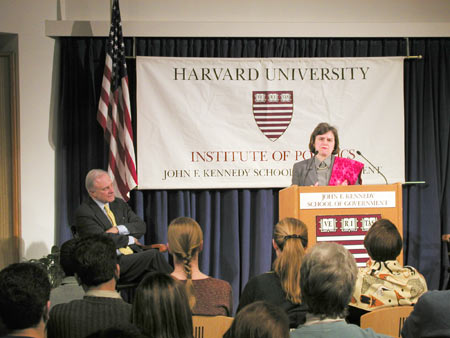Bertini urges action on hunger

Progress has been made in the worldwide fight against hunger but action is still needed to help the 777 million people who still don’t have enough to eat, Catherine Bertini, the executive director of the United Nations World Food Programme, said Thursday (Feb. 7).
Bertini, fresh from a trip to Afghanistan the week before she spoke, said anticipation of increased need for food because of the region’s three-year drought put the World Food Programme in a good position to handle the fallout from the coalition war that toppled Afghanistan’s Taliban government.
Afghan operations have actually gone better than expected, she said. Organization officials thought the need for food would increase from 28,000 tons per month before the coalition war to 52,000 tons per month, the amount needed to feed 6 million Afghans. With the United Nations pulling its equipment, trucks, and personnel out of Afghanistan when the war began, Bertini said, the World Food Programme thought it would have a difficult time meeting the increased need.
Instead, using commerical drivers accustomed to conditions inside Afghanistan, the program shipped food from surrounding countries, shifting routes when the fighting became too intense along one of the roads into the country.
The result, Bertini said, was that in November 2001, 70,000 tons of food were brought into the country, and in December, 100,000 tons were delivered.
Bertini spoke last week at the Kennedy School of Government’s ARCO Forum. The speech, titled “Afghanistan: A Turning Point for America?” was co-sponsored by the Institute of Politics Student Advisory Committee.
Bertini singled out for praise the Afghans who guarded the World Food Programme’s warehouses across the country. Despite the presence of multiple armed factions, only one warehouse was looted and its stores of food lost, she said. The others not only held onto their supplies of food, but remained in operation, taking in stores from other places and shipping them out to those who were hungry.
The second group Bertini praised is the women who worked for the organization during the Taliban’s reign. Though banned from work, Bertini said, the local women who had held jobs in their offices continued working from their homes on computers supplied by the World Food Programme. They would complete their work and deliver the results via computer disc. On one occasion, Bertini said, the Taliban arrested four women right outside the World Food Programme offices and imprisoned them for four days.
Today, Bertini said, there is a thirst for education in the general population – and especially among women. During her recent visit, she stopped at a former girls school that had been converted to an army outpost. She saw all the classrooms full of girls, with teachers teaching without pay. She saw boys learning in groups in the courtyard even though school is not officially in session until March 22.
Bertini said that though there is a new sense of hope in Afghanistan, there are too many hungry in the world for rejoicing. Though the number of hungry people has fallen from 950 million in 1970 to 777 million today, there’s too much work to be done to declare victory.
“There’s so much we need to do because even though that’s good news (that the number of hungry has fallen), it’s not good news that 777 million people don’t have enough food,” Bertini said.
Bertini urged the audience to work to convince Congress to increase U.S. international food aid and to take personal action, such as supporting nongovernmental organizations active in the fight against hunger.
“I hope Afghanistan will be a turning point for America. Each one of us and the American public in general can make a difference,” Bertini said. “One by one by one we can make a difference for the whole world.”




